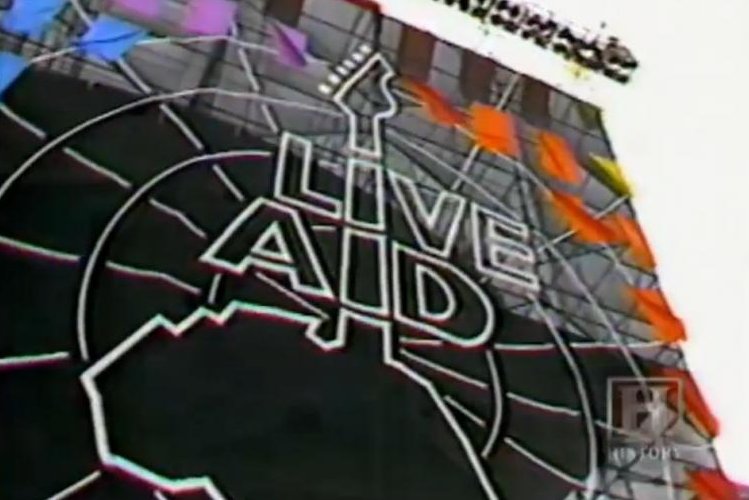Live Aid, considered by many to be the biggest rock concert in world history, took place in Philadelphia and London on July 13, 1985, and reportedly raised more than $230 million for African famine relief. Photo: History Channel / AOL
LONDON, July 12 (UPI) -- They may not look like much now, but two plots of ground in Philadelphia and London were ground zero exactly 30 years ago this weekend for two of the most historic rock concerts the planet has still ever seen.
Billed as Live Aid -- and featuring some of the world's biggest names in music -- the July 13, 1985, event drew unprecedented television coverage from around the world and a royal cash haul, with organizers hoping to make a dent in the catastrophic famine that choked Africa during the early half of the 1980s.
Created, synced and orchestrated by former British rocker Bob Geldof, even three decades later the shows continue to live in beloved musical folklore. Some even called it the Woodstock of the 1980s generation.
"Yours truly was among the 101,000 in the stands in Philly 30 years ago for this exhilarating occasion," Philadelphia Inquirer writer Joanne C. McHugh wrote in a retrospective Saturday. "I knew how the baby boomers who had been to Woodstock reveled in being able to say that they had been there. Live Aid was my shot at attending a generational touchstone event."
Further, the lineup card was a literal who's who of the global music industry at the time. Commentators say the Live Aid concerts -- held simultaneously at London's old Wembley Stadium and Philadelphia's now long gone JFK Stadium -- turned out to be an event unlike any that came before, or any that have come since.
"My contention is Live Aid 1985 was probably the pinnacle of rock 'n' roll," 1980s MTV personality Martha Quinn said. "Bob Geldof single-handedly changed the entire decade of the '80s. He transformed us from the 'Me' Decade to the 'We Care' Decade."
Live Aid was the first concert in history that was a true global event, transmitted via satellite to all corners of the world -- and broadcast by the BBC in Britain and ABC and MTV in the United States. One of the British broadcasters even famously remarked that 95 percent of the world's televisions were tuned to the event.
"More than any other event, this one made caring about the world part of the rock 'n' roll package," New York Daily News columnist David Hinckley wrote. "Popular musicians had donated time and tunes for important causes before ... But by playing out in front of the world, Live Aid sent the message to artists and audiences that caring isn't optional."
Although it featured some of 1985's music's biggest acts, and was being billed as the biggest concert in history, Live Aid was actually not about music. Geldof was on a mission to make a difference in the lives of thousands of Africans who were dying daily from starvation. The concerts not only rocked the world, they shocked the world -- opening humanity's eyes to the devastation that had gone largely unseen by the rest of the planet.
Musicians like U2, Queen, David Bowie, Sting, Paul McCartney and Elton John headlined the British side -- while Madonna, Duran Duran, Bob Dylan and Led Zeppelin starred in the States. Phil Collins played both, famously hopping aboard the Concorde after his London set to make his later scheduled performance in Philadelphia.
Both shows ended with each side singing charity singles that jump-started the movement that ultimately led to Live Aid: "Do They Know It's Christmas?" in Britain and "We Are The World" in America.
"The marathon show was finally capped by an ensemble version of USA for Africa's benefit single 'We Are the World,' after which I retreated to my hotel but couldn't sleep for hours because I was so wired from the euphoria of it all," Boston Globe rock critic Steve Morse wrote. "Nothing has matched Live Aid for its stunning impact, back when it all seemed so fresh and everything seemed possible."
Many music fans will say British rock group Queen, and charismatic frontman Freddie Mercury, stole the show. Others might recall how U2 leader Bono leaped from the stage to dance with a girl in the crowd -- right in the middle of their set.
"The pinnacle of the pinnacle of the pinnacle, the tippy-top most top of that day, was probably Queen's performance. That is the top of the arc of rock 'n roll," Quinn said.
Some remember the concerts for who they didn't have -- like Michael Jackson, Bruce Springsteen, Prince, Billy Joel and Paul Simon -- as well as the fact that both sides had a conspicuous lack of black performers.
Then there were the memorable miscues -- like Led Zeppelin's utter disappointment with their performance, Duran Duran lead singer Simon Le Bon's squeal and Paul McCartney wrapping the British show with a rendition of the Beatles' "Let It Be," half of which couldn't be heard by the crowd because his microphone was turned off.
In the end, the concerts are said to have raised more than $230 million for famine relief -- and it was reported that nearly 2 billion people in 150 countries watched at least part of the event.
Three decades on, though, Live Aid still resonates.
"Pop musicians have continued to answer the call for help -- examples include benefit shows to help victims of Hurricane Katrina and Hurricane Sandy," Morse wrote. "These are noble efforts all, but the one that still stands above the pack is Live Aid, which set the template and was arguably the most globally significant event ever held by the music industry."















